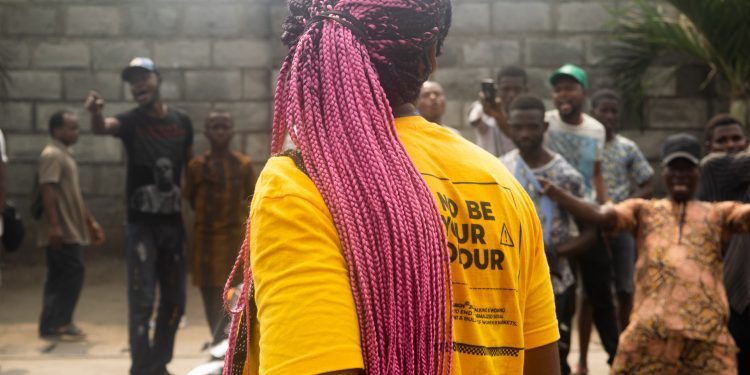It’s 2021, and gender norms still play a big part in telling us what is appropriate for women and men to do in our society. Because of this, girls and women often have more obstacles in their way to fully achieve their potential.
This year’s theme, Choose to Challenge, couldn’t be more appropriate, as there are lots we can do to help build a more gender-equal world.
In December 2018, I chose to challenge sexual harassment and catcalling in Lagos markets. Harassment and catcalling on the street limit women’s right to walk freely around their environments–many women admit to being overly conscious, walking down their streets at night or the market. It was great to take that challenge to the streets, having earlier joined a group of bold, young women who dared to make our voices heard and refuse the normalisation and inaction that is so often associated with these incidents.
It has been a beautiful journey since then: as each day passes, I become more aware of how these gendered obstacles intersect across class, tribe and country, and I learn more from women who are boldly sharing their experiences online and offline.
To mark International Women’s Day, here’s how can anyone join in to challenge the biases that exist around us:
Choose to challenge objectification
Nobody likes to be treated as a commodity or an object without regard to their personality or dignity. Choose to challenge this by speaking up against objectifying language and representation of girls and women.
Choose to challenge discrimination in the media
Stories are a powerful way to either perpetuate positive or problematic ideas. Choose to challenge stories that portray women and girls in a reductive or unfair way, whether it is in your children’s textbooks, in an advert or in a film you’ve watched. Find out who is responsible and write to them to let them know your thoughts.
Choose to challenge bias at home
Women are still disproportionately responsible for childcare, amplifying the difficulties that they face in their careers. Choose to challenge this by recognising household chores and children’s care as every adult’s responsibility. Ask if there is an equal division of labour in your home and how each person takes responsibility.
Choose to challenge by listening and reflecting
People, including myself, often have difficulty recognising prejudice that doesn’t affect them. We all have biases based on race, tribe, religion, sexual orientation and gender. The important thing is to be aware of our assumptions and challenge them. So, choose to challenge by paying attention, and when someone points out something problematic in your speech or actions, listen and reflect on it.
Sometimes calling out discrimination carries very real risks, some more than we are willing to take—Marathon, not sprint. Don’t feel defeated by these big obstacles – each achievement is a step towards our shared goal for a more inclusive world.


